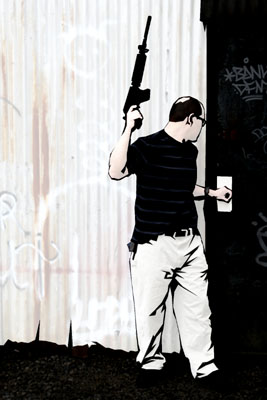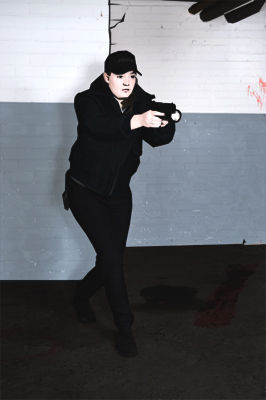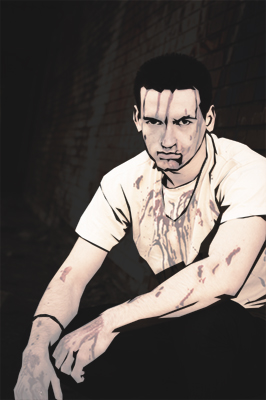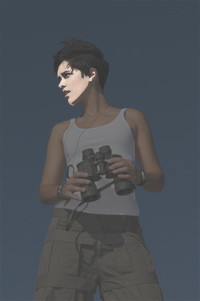2010-02-19 : Shared Positioning at the Micro
So we've got this:

Now let's throw in this:

This:

And some of this:

(Not shown: at least one dead body already, a boxful of cash.)
Each of these characters has evident qualities that they can bring to bear in action (effectiveness); reserves that they can draw upon or use up (resource); and qualities that locate and anchor them into their world, physically, emotionally, morally and so on (positioning). But today I want to zoom in on another thing: their immediate, shifting, short-term and micro-level positions with regard to one another. How far apart they are, what's between them, who can see whom, who's in motion toward whom and away from whom, who knows about whom, all that kind of stuff, right? Their immediate circumstances.
Now first: It should be obvious, if it hasn't been all along, that currency is in play both within any given character, and between the characters. My character opens fire on yours, I roll to hit and you mark wound boxes: it's your resource on your character sheet that my effectiveness changes.
And second: if you've ever seen a movie, you know that with a setup like this one, tiny changes in immediate circumstance can have dramatic cascading effects. Gun guy opens the door and bam, everybody's whole range of possible effective action changes dramatically. Somebody moves across the wrong window, somebody sees somebody's foot poking out around a corner, somebody crosses in front of the shadow where somebody else is waiting without first shining her flashlight into it - movements at this micro scale can transform a character at EVERY scale. "I have a gun" becomes "I have a concussion and no gun," "I've never killed" becomes "I've killed," "I'm fine" becomes "I'm experiencing precipitous blood loss and now I have seconds left to live."
This is currency! How do changes here become changes there? Answer: your game's currency rules.
I'm still working toward reliable vs unreliable currency, but next stop: circumstance-responsive vs circumstance-analytic rules.
1. On 2010-02-19, Vincent said:
Now I'm just having fun, but I believe the dead body used to be this guy:

(All these images are, again, made from stock photos licensed from dreamstime.com.)
2. On 2010-02-21, Anarchangel said:
This has been a really interesting series of posts and comment discussions, but my question relates to the pictures. What do you use to create this style?
3. On 2010-02-21, Vincent said:
First you find your stock photo:

In Photoshop, slap a white layer over it and make it half-transparent:

Do a black layer, also half-transparent:

Use the lasso tool to select and delete chunks out of the black layer:

Carve the black layer away and away:

Adjust the opacities of the black and white layer until they're how you like 'em:

And done!
I work much bigger than these little images, of course. I sometimes use a half-transparent red layer, too, to deaden color contrast.
4. On 2010-02-21, John Harper said:
(Protip: if you use the Pen tool instead of the Lasso tool to draw your shapes, they remain editable and scalable vectors. Sometimes this is a good thing, but may no be strictly necessary for these.)
5. On 2010-02-21, Nathan Herrold said:
Vincent,
Isn't all currency kinda unreliable?
Can ya explain reliable currency to me?
6. On 2010-02-22, Teataine said:
I believe that will be the subject of a future post. Best to wait.
This has been a great series.
7. On 2010-02-22, James_Nostack said:
While we're on the subject of illustrations:
The dude at the top of the stairs, pointing his gun at me: what the hell is that weird white-shaped thing by his head supposed to be?
8. On 2010-02-22, Vincent said:
John: I'll see if I can figure out how that works, thanks!
Nathan: A quick preview!
Remember the example of the warrior who becomes mayor? Here's a reliable currency rule:
If you switch your class from warrior to politician, your experience in battle half-applies to the political arena. Buy politician abilities with half the total XP you've spent on warrior abilities.
So if our warrior has spent 50 XP on warrior abilities, when he makes the switch to politician he reliably gets 25 XP to buy politician abilities. His player can use this to decide when and whether to make the switch.
Here's a corresponding unreliable currency rule:
If you switch your class from warrior to politician, does your experience in battle apply to the political arena? Roll percentile dice. Buy politician abilities with that percent of the total XP you've spent on warrior abilities.
So now if our warrior makes the switch, how many XP he gets to buy political abilities with isn't reliable. If he rolls a 15 on the percentile dice, that gives him 8 XP - I guess he learned things from battle that don't really apply to politics. If he rolls an 80, though, that gives him 40 XP, and so he's able to bring his battle experience powerfully to bear.
Hold off on discussing this for now, everybody! This is just an example of what I mean by reliable vs unreliable currency.
James: Just the stop of the stairwell. If you squint, you can make out the pipe handrail attached to it.
9. On 2010-02-22, Roger said:
Just because sometimes terminology can get in the way, I wanted to confirm that:
The economy of the game is also:
- the physics of the game
- the morality of the game
- the tactics and strategy of the game
and on and on and on.
10. On 2010-03-02, Joshua A.C. Newman said:
Vincent, these are really neat.
I'd do this in Illustrator, myself, because the pen there is so much better than the one in Photoshop. Excellent technique, though.
11. On 2011-08-01, stefoid said:
This is the same technique you used in Apocalypse World images, yeah?
RSS feed: new comments to this thread
This thread is closed to new comments.
home: anyway.
newer thread: 2010-02-23 : Can your brains just do it?
older thread: 2010-02-18 : Currency - Spanning Divide and Range



















